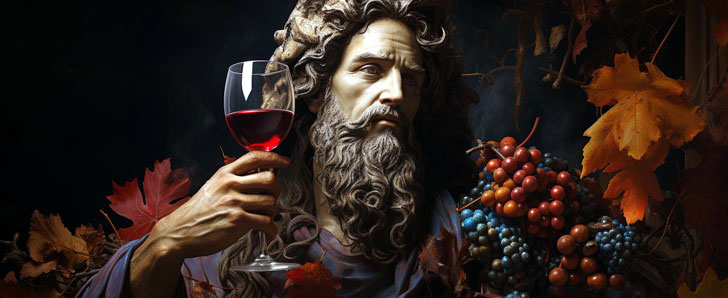
The Last Disciple
I, the last disciple
and initiate of the god Dionysus:
and can I, at last, start to give you, my friends,
a small taste of this philosophy, as far as I am permitted?
In undertones,
which would be best,
since it concerns many things that are
secret, new, foreign, strange, uncanny.
Even the fact that Dionysus is a philosopher
and that, consequently, even gods philosophize,
seems to me like something new and not without its dangers,
something that might arouse mistrust precisely among philosophers,
– among you, my friends, it has less opposition,
unless it comes too late and at the wrong time:
I have been told that you do not like believing in God and gods these days…
He once said: “I love humans under certain circumstances”
“I think humans are pleasant, brave, inventive animals
that have no equal on earth, they find their way around any labyrinth.
I am very fond of them:
I think about how I can help them advance
and make them stronger, more evil and more profound than they are.”
– “Stronger, more evil, and more profound?” I asked, startled.
– “Yes,” he said again,
“stronger, more evil, and more profound; and more beautiful”
– and at that, the tempter god smiled his halcyon smile,
as if he had just paid a charming compliment.
You can see: this divinity lacks more than just shame
–; but you can also see that there are good reasons
for supposing that the gods could learn a thing or two from us humans.
We humans are – more humane.
Beyond Good and Evil, by Friedrich Nietzsche, trans. by Judith Butler, aphorism 295
This is a sad passage, a reminiscence of the last follower of Dionysus, a god of the Greco-Roman pantheon of antiquity. The text reminded me that Beyond Good and Evil was my initial exposure to the writing, and thought of Nietzsche. Would anyone disagree that Nietzsche is a “dark” philosopher? He is controversial and foreboding, arguably the first philosopher of the 20th century.
Several days ago I made a new acquaintance while at Starbucks. I learned that my new friend was a disciple of Krishna consciousness, which is a variety of Hinduism. Again a reminder that gods philosophize, religion is by no means benign, some interesting stories and good times at church, or at a temple. Belief/discipleship means that one follows a path, a disciplined way of life. There is rigor, life constrained in detail by a point of view. Religion and philosophy are not practices without risk. Knowing is simply not possible from any external point of view. You must hazard to push your chips-to-the-center of the table, to be “all in” if one is to know.
The new friend offered me a small book of information about Krishna consciousness. Though I am certainly not in the market for another god to follow, I politely received her gift.
There is something that none of the gods could possibly teach us.
That lesson is how to be more human, more open, more generous to one another, more humane.
This lesson we must learn on our own, without help.
2 thoughts on “The Last Disciple”
According to a seeming authority on the ancient gods, “Dionysus was the god of wine-making, orchards and fruit, vegetation, fertility, festivity, insanity, ritual madness, religious ecstasy, and theatre.”
He was given a lot to cover. Do these subjects somehow overlap? I do find the juxtaposition of ritual madness and religious ecstasy both odd and somehow reassuring. No wonder he was also considered the philosopher/god.
In today’s world we continue to have no shortage of self-proclaimed gods. Musk, Trump, and Putin are but a small portion of those who have elevated themselves to god-like status. The main difference between these modern day deities and the attributes ascribed to Dionysus are that these mortals refuse to considered their own fallibilities and truly believe they are omnipotent.
I sometimes think that if we could just eliminate about 100 of these ghouls in positions of power that the world could be a better place. But rationally I also know that others would immediately fill their shoes and we would be no better off.
It is indeed that propensity towards evil (I use the world evil to describe behavioral characteristics that are detrimental to the survival of our species) that seems almost inherent in humanity, as much as I would like to believe otherwise.
[sigh]
Nietzsche outlines in his first book, The Birth of Tragedy, the contrast between Dionysus and Apollo. the juxtaposition of the wild, idiosyncratic with truth, logic, and order mirroring the two forces of human nature. We have overemphasized the Apollonian. Our way of life is desiccated of the aesthetic due to our devotion to reason, and the direct exercise of power that is consonant with reason.
Perhaps it is inevitable in a capitalist society that our robber-barons are minor deities. The financial resources at their disposal means that they are by and large immune from being called into account for their hubris.
I wonder that no matter the basis upon which a society achieves success, that secularization is inevitable and the old gods become irrelevant. New gods cannot be summarily minted. The Greeks had the idea that humans ought to respect the golden mean, the uncomfortable necessity to always assess “how much is enough,” to avoid overreach, attempting the erasure of our vulnerabilities by the prowess of our reason, or by piling up money!?